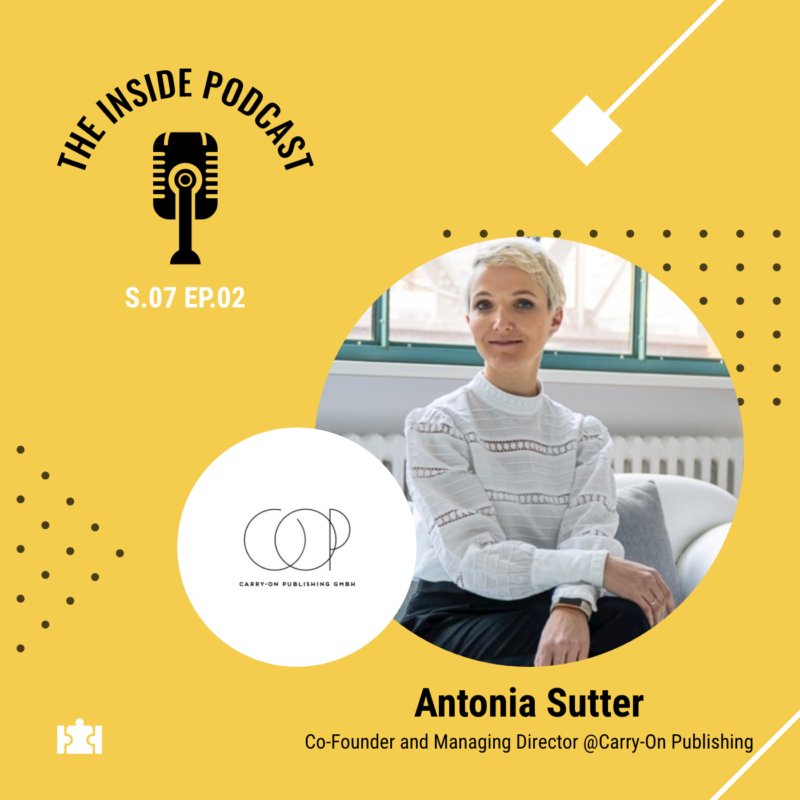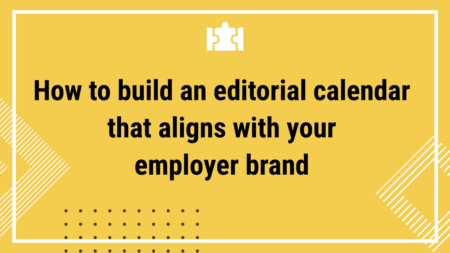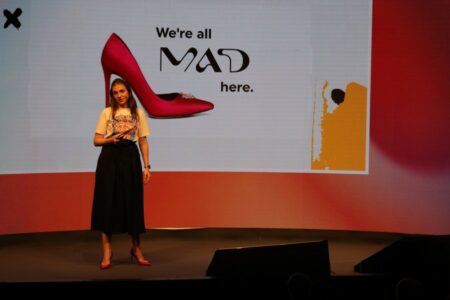Hi, my name is Georgiana. I am the CEO and founder of Beaglecat, and soon you will be listening to Employer Branding: The Inside Podcast. In this podcast, I regularly talk to employer branding managers and acquisition managers, and human resources managers in tech companies in Germany, Romania, and the US. For more content on employer branding-related themes, go to employerbranding.tech or beaglecat.com. Stay tuned!
Overview
In the 2nd episode of the new series, we met with Antonia Sutter, Co-Founder, and Managing Director, at Carry-On Publishing to talk about how #employerbranding is done in creative industries. We also talked about #creativity, building an inspiring #culture, product branding, the importance of making mistakes, and learning from them, and a lot more.
What you’ll learn by listening
- Insights on building an inspiring company culture
- Making mistakes & learning from them: the key to a healthy workplace
- How product branding & employer branding blend together
- How people become brand ambassadors when given the right resources
- The impact of trends happening in the workplace
About Carry-On Publishing
Carry-On Publishing (COP) is a media house for purely digital magazines and storytelling studio based in Berlin. Founded and self-financed in 2013 by Theresa Neubauer, Alex Sutter and Antonia Sutter, COP is independent and not part of a large media company.
“Our goal is to offer our readers content of the highest quality. At the same time, we would like to enable our partners to use sustainable communication for brand building, brand maintenance and products that convince.”
Podcast link – Enjoy listening on Spotify!
Podcast transcription – Employer Branding T.I.P S07Ep.02
Georgiana:
Hi everyone! Georgiana here with a new episode of Employer Branding: The Inside Podcast. Today I am sitting face-to-face with my guest. Her name is Antonia Sutter. Hi, welcome! Thank you so much. And in person on top of it all. We’ve been planning to have this podcast episode for I think, two years, maybe two years. And before I tell everyone what Antonia does, it’s also fair for me to say that we’re opening our German podcast season, so to speak. I’m really excited to talk to her about employer branding from a founder’s perspective. And before I let her introduce herself, I will just say that she has founded Carry-On Publishing, which is the mother agency of SisterMag. First, it was the magazine. And then you told me there was the agency. It’s a family business, but please expand a little bit on that so our guests know where your standpoint comes from.
Antonia Sutter:
I could say, we are an atypical startup because we are not founded or have any investments. We really started 10 years ago. And we started with the magazine, which was based on the master’s thesis of my sister who studied publishing. She had liked this work, how does women’s, the women’s magazine of the future of the digital future look like? And so she researched that, theoretically, and we said, we need to prove what is written. And so we launched the first issue and it was really successful that we had 70,000 readers. I think we were lucky. We were featured by Apple at that time.
Georgiana:
Yeah, but being lucky is not just being lucky. It is also a lot of hard work. I’m sure.
Antonia Sutter:
From a kind of a side project, we decided, okay, this seems to be something. So we started to make plans to make this into a business company. So the first maybe three years, it was really a publishing business. And we had advertisement as monetization, but from the start as content marketing.
Georgiana:
Exactly, it kind of started with content marketing. I know.
Antonia Sutter:
So we produced all the features from the clients for the magazine specifically. And I think after three years, the people said we like your content. Maybe could we also use it for something else not connected with the magazine? And so from there it started and that’s how our content production site started. And content production is very near social media. We also do a lot of social media management.
And in that field, we are very focused on two kinds of nature industries, one is beauty because we are one of the three of HSPs in Germany that are officially affiliated to do the social media for them. And then we have several other ones that do plus and stuff like this. One is home appliances, okay. Technically, we always laugh about it because my sister said when we started “Can do everything besides beauty”.
Georgiana:
Always happens like that, right?
This is the part through which we earn our money. The thing that was also very good during COVID, was that companies needed content. But besides that, we always had the magazine, and in the magazine, a big part was a DIY section, such as self-made clothes. Because people always asked us, oh, why don’t you have the patterns for the clothes in the shop so we can buy or do it ourselves? So we used COVID time to launch the shop for that. This is a classic online shop for sewing patterns and delivery is not needed because it’s all digital.
Georgiana:
What kind of employees and people does your company attract?
Antonia Sutter:
It’s very funny because it attracts women. So we only have women, besides Alex, my husband. We only have female employees. And it’s not a choice.
Georgiana:
It’s totally understandable.
Antonia Sutter:
I think we have two main categories of people. We need classic project managers who are really good at organization. We look for creative project managers who also like themselves to write or to style or anything. So it’s not just the organizational part. But if you want also to be a bit more creative, you are in the right place. And the other one are really creative people, such as in-house photographer, designers, motion designers. We really have the people who do the work in house also.
Georgiana:
That sounds really nice. And I’m wondering, what attracts these people to your company because it’s been such a while, such a long time since the magazine existed. It’s impressive!
Antonia Sutter:
I think what attracts is a very family-based atmosphere. We are a real family and also the people in the company, I hope and I have heard feel like part of the family. So I think, of course, there are places in the city where you can learn more, but we are very friendly with people who have children and are flexible with times, and have the freedom to work as a woman and as a mother.
Georgiana:
So you’ve embrace the new work sort of trend …
Antonia Sutter:
Although I have to say that we have a policy that people come into the office regularly. We have some people who are totally remote, more like part-time student people. The fixed team is based in Berlin, so if they have something to work from home, they can do that. But we have found that being creative needs to be in person and being done.
Georgiana:
Yes, there are still areas in which you need to come to the office and coordinate with your colleagues. And if it were for you to summarize the culture of the company or to define it in just one word, what would you use for it? Or a sentence, let’s say not just the word.
Antonia Sutter:
You caught me. It’s really difficult but I would dau inspiring and also reliable. You know what you get. But back to the opportunity develop in the ways you want. We try to offer opportunities, and we give early on very much responsibility to people who want them.
Georgiana:
Yeah, this could be actually the secret to a successful creative business, right? Trying to mix the two worlds at the same time. And if you were to ask your colleagues what they love most about working in the company, would they get the same response?
Antonia Sutter:
I think because we discuss a lot with them. I think they like the trustful atmosphere that they can also come with problems to us and with things they are bothered with. But at the same time, they also feel that we trust them and that they can develop themselves. I I had that as a young professional that it was always cold. And they put you boots that optical that you need and you grow into them and that’s something we also do so. That has to be connected with, if you make mistakes it doesn’t matter. You always have security from your superiors, from your bosses.
Georgiana:
It’s meant for growing in the end.
Antonia Sutter:
Mistakes happen, especially with what we do. I mean, social media.
Georgiana:
Oh, yes. Oh, yes. I know what you mean; publishing the wrong content or at the wrong time or tagging the wrong person? Yeah, it’s awful, as well.
Antonia Sutter:
And also with also companies with loads of people who say, and they are not always aligned.
Georgiana:
I know the struggle. I know, working on projects with some parts of the company. And then the big boss comes in and says, No, we’re not doing this. Okay. I understand. But coming back a little bit to the core topic of this podcast, which you have touched on, actually, is Employer Branding something that Sister Mag looks at deliberately?
Antonia Sutter:
Maybe not deliberately, like a big company. But of course, I have to say attracting people is not easy if you’re a small company. But by having, for example, the magazines or things that are more visible, this kind of employer branding, as well. So yeah, somebody searches our stuff, then they see, okay, we are very design-focused with a unique way of doing things.
Georgiana:
And I think it’s actually one of those rare cases or occasions where the branding of the product or the main branding of the business coincides with what happens in the employer branding department, and you get exactly the people who you want to attract, you get into to apply for jobs in the business.
Antonia Sutter:
It’s definitely the case. People in interviews tell us, we had to look at the magazines we had in the past. We have one video about bookbinding, which is a very typical systematic DIY project. And this hit runs on YouTube for years now, because it’s a very specific technique, and people apply it or so at first because of this video.
Georgiana:
So you’ve been doing Employer Branding before employer branding was quite Employer Branding, which is something I really like because you know what we did in Beaglecat, the agency that I’ve been running for almost 10 years. Now, when we have the bigger team, now, there are only four of us. But when we were about 11, or 12, whenever I wanted to attract someone, I wrote an article, a very personal article, you know about what life in the agency is like, and how we function together as a team, what kind of projects you would be working on. And I always got the best service and the most qualified people, and only the ones who are able to see who you really are. And, you know, not not the lies that most companies put out there.
Antonia Sutter:
I think we don’t have to tie in to make huge with what we offer. So it has to be the work that speaks for us. And I think that has served us well, so far. We also do a lot of referrals of people who have worked for us, and vouch for us, and we’ve got a lot of especially in their internship, working students whom we also recruit.
Georgiana:
This is actually why your perspective is so valuable to me because you’re not a predominantly tech company. So it’s interesting for me also to see how do creative smaller businesses do employer branding; and how they attract their workforce. And this is, like I said, very valuable input. But then when it comes to employer branding, I don’t know from your personal perspective, what do you think about it in general? How should I put it? What would you like for the company to be doing more when it comes to employer branding? By company or general maybe in general or your company? I don’t know. I haven’t thought about this question a lot but I think every point of view would be a useful one.
Antonia Sutter:
I always like to see what people do, not like this streamlined interview process.
Georgiana:
This is gold, and we’ve been talking about it for years. Thank you.
Antonia Sutter:
Like, look behind the curtains? I think that’s what I would look at. And also, I look at the product of companies. I think maybe that’s very typical to, I must be inspired of what they create or what they do. Yeah, of course, I think that also relates to tech companies or to anybody else.
Georgiana:
You would think. But they don’t do it. It seems to them that people would not want to know what the I don’t know, a data analyst has to do on a day-to-day basis. But they would, right? If you’d like to know how one data analyst in that company carries on their daily duties, why not?
Antonia Sutter:
I actually saw a YouTube video of a data analyst at Spotify. It was a personal account, and she followed herself with a day in her life in New York City. I think wasn’t sponsored. I saw like, Okay, I could apply and see how the people interact.
Georgiana:
And what kind of people you’d be working with, when you see what she’s passionate about and where she lives, and what she does.
Antonia Sutter:
If you have people in the company who like to influence and pose, just give them the resources to do it.
Georgiana:
If you have people period. Just give them the resources and the opportunity to express themselves, and then you’ll be amazed at how many others apply for the same environment. Um, two things you wish you’d known when you first started out with your company. Not necessarily Employer Branding. I know I would have done things a lot differently. But I’m curious.
Antonia Sutter:
I think, in general, I’m still fine with how we did it. But I think now I would, I would have started earlier to, you know, we came to medicine publishing from a very old school publishing. We didn’t start as a website in itself, but we had this widget, which looked like a digital version of a real magazine. Okay. Yeah. And we created content, at that time, very much old school. So very bright topic. So for example, we hit one issue about backspace and butterflies, and we covered this topic from various angles. And this is how you in on scope, like it was about Association, very wide topic. And this is not how the internet works. It’s super focused.
Georgiana:
Very SEO.
Antonia Sutter:
And I think we if if I would start again, from the beginning, very much integrated that. Although I think it developed us as a content producer, in a way. It’s analogy, if you can’t pay for it, how we can associate and also now when you do social media channel to have this thinking out of the box, it helped with that, but for the magazine itself, it made it very difficult now to you can’t do a white, right topic magazine anymore. Yeah,
Georgiana:
I know. Although I have to admit that for us, we’ve also been active in content marketing since around 2012 – 2013. And I learned to do content marketing on my own by reading what people in the States were doing. And we start to doubt ourselves after that. We discovered that the best pieces are not necessarily the ones for various your dream. And so you have to decide in the end, do you want a lot of traffic coming to your lead generation pages, to your client generating pages? Or do you want the topics which are interesting and relevant and bringing a lot of references? So it’s a choice, you have to make.
Antonia Sutter:
We’re now very much focused on DIY. It’s very focused, and we rework a lot of the old stuff. And it’s still very interesting, and it’s a new challenge to rework what you did in the past. If you ask me, this is definitely something I would have started from the beginning. Also, I think when we go to the employees, I think you learn over time that you have a core team and then there are people who are with you a part of your journey, and then they leave and they go somewhere else. And I think we are now very good to have this and also to see them grow somewhere else. In the beginning, it was hard.
Georgiana
It was painful. Yeah. I can relate to that.
Antonia Sutter:
Yeah. This was a learning experience from which we learn not to take it personally. As a founding team we had to accept that now we have a lot of people who are not with us anymore, but there’s still very much connection. We work with freelancers from time to time on projects. And it’s nice to have kind of like a network of people who know how we work and but they are now as their own bosses, or really well developed good jobs. Now I feel proud that we develop into people who are now thriving.
Georgiana:
I know what you mean. And I think it’s part of your personal journey, as an entrepreneur to learn these things by, you know, by doing them. And by understanding that you can leave open doors all the time, you don’t have to take things so personally, and yeah, but it’s a question of growing. I know, it has been this way for me as well, because I was very hurt, in very beginning. And we would cry when the person will leave the team, we would hug each other. But you know, either I would let them go. Or they would leave for different reasons. Oh, my gosh, it was so painful.
Antonia Sutter:
And yeah, it’s time I think you learn to react differently. I think we are very close to the end of our discussion. I’m really curious to see your perspective a little bit regarding trends in the workforce recently, because during COVID, we had this great resignation. Now, starting November, December, we have had this huge wave of layoffs in tech, at least. How do you see things evolving from now in the creative industry? Do you think there will be layoffs here as well? Do you think maybe the market will stay the same for this part of the industry?
So far, we haven’t seen a big influx of new applications. So I don’t see right now that I mean, I’ve seen in the State some agencies have let go of people. But I read a bit more on it. And it was more because it was a merger of agencies anyways, and they just took a while this for the people who actually said yeah, when you’re gone. So I haven’t seen a big wave on that part. In a creative business, you’re used to have a small internal team and to work with huge amounts of freelancers. So I don’t think if you are a creative business, that you will let go of too many people because you don’t have this meat on the bone as Google or major head anyways, because you are very much more lean. And you’d rather say okay, and then I take a freelancer for that project. Right now. I mean, we are right now it’s very much normal.
Georgiana:
Okay, that’s good to hear.
Antonia Sutter:
Yeah. I think the development for me in Germany is that, for example, or to complete creativity, not a project managers, but the designers on German, okay. And all from all over the world. And this has been now for four years now. And this is a trend for me, we actually really actively search
Georgiana:
For people from also good business model. Of course,
Antonia Sutter:
I think this is a trend for especially the parchment if you don’t need perfect German. Indeed. And we also used a lot of freelancers from, like everywhere in the world for all our creative stuff about through platforms like Upwork retouching, and also the grading of patterns. They have, actually people from this Philippines, from Mexico, from all from everywhere, but
Georgiana:
that helps. I think that helps tremendously, right, because you get the cultural heritage of each person itself and bring it to the wow.
Antonia Sutter:
I think that’s probably a tragedy for creatives that they don’t emerge in the sense that all of other people on one point, yeah, yeah. But that I mean creatives as a common language. Yes. So do you can work on projects
Georgiana:
I see actually, more and more companies who are in between around 20 to 50 people approaching this model of working more with freelancers in these times. So maybe I don’t know, they’ll make the model permanent, but it is developing for sure. And that fits both parties.
Antonia Sutter:
Because you also need for each project, can you have different kinds of needs for creatively, and you can employ in all different kinds of use cases, which is not possible to, you know, okay, this client wants to have this style, then it’s more than we research like worldwide, who has a loose fitting style, if we just approach them and want to get out on a project basis? Makes more sense to have him sort of our own in house illustrator, try to be somebody else.
Georgiana:
Yeah. And then the pressure on you to find as many projects for that person to carry on. And I know that pressure all too well. Last question for us today. Because you’re one of the founders of a very small company, I imagine that you’re the one carrying the vision of the company, you as a person and probably the other co founders are what inspires your employees, your colleagues, on a day to day basis. In my right, it’s usually this way when the companies are rather small. So I’m wondering, how do you manage to always stay on top of of the situation? How do you always manage to stay optimistic about what’s to come? And how do you manage to not stress a lot? And what helps you be the person you are?
Antonia Sutter:
I think, for us, it helps that we, that my co founders, family, all the stress that you have over date, go behind my back is this absolute ground, then we have very good task separation between the three of us because we are very different, very different in our skill set. So if if Alex says we need to do it like this, this this, the other the two of us never say, oh, no, we wouldn’t do it like this, or let me do it. Because this part, and he does. So I think this helps from our management among us. And I think we’re not always the best in stress management, because being an agency is stressful. I mean, you’re basically a service provider to people who pay your money to be there for them. So, you know, stress in itself.
Georgiana:
Exactly, exactly. That’s why I’m asking,
Antonia Sutter:
I think what helps to reduce the stress everybody in the team is to, to really create the feeling we are in this together, we tend or try to not put, like, when I get pressure from a client to put it just threw it on the people in the team. And to know, I tried to,
Georgiana:
To mitigate a little bit.
Antonia Sutter:
For them, yes. And then to have a very strong team to get them to laugh a lot. We like I like a lot my see all the seniors in my team, they created on their own last year, Thursday evening drinks, so they just like it’s very simple, but they always win Thursday evening. So this step in our kitchen and have a nice drink together. And I like this is very informal. And yeah, we support that. And, and so we try to also give them the time and the means, then I think what also stressed releasing is, is that if people have to go to the doctor or have appointments, yeah, we try to be really flexible, nobody has a day of holiday, because he has an appointment so that you have this freedom in yourself, not Oh my God, I need to pick it out and they will be anyway and
Georgiana:
which is still characteristic of the creative industry if I might add. it’s very, very different from the tech one, you know, because I work in both worlds at the same time. And many times I think of that, well you have no idea how things are like in creative agencies very different from
Antonia Sutter:
Very much stayed long hours. Yeah,
Georgiana:
Depending on what the project involves.
Antonia Sutter:
So I think this and then also at creative ways. We have an interval messenger and we have groups of all the projects that we have also just one channel where we send in it’s funny memes. To see and to to mitigate this and also to take the time if we have lunch together, which we have every day and we have a good discussion up admit it takes longer, nobody looks at the watch and says, Oh, no, today we had one hour and 15 minutes. Now we have to work 15 minutes longer than usual. Of course not. And we try to be flexible. And you know, also give them the feeling that we enjoyed this.
Georgiana:
Then it’s a journey that you take together, right?
Antonia Sutter:
And what personally, what I tried, I had a very rough last year health-wise and to be in the hospital through various times. And I tried super open and I explained everything very early to the whole team. I think that helped a lot. Because otherwise people always get a stapler,
Georgiana:
Yeah, they fill in the fill in the blanks on their own.
Antonia Sutter:
So really, in detail what I asked what will be happening, and even I had a small thing, I sent a picture to everybody, like half an hour after the surgery and said, I’m still alive. And we tried to be communicative, communicative about it. Because I feel if you’re such a small team, and I very much are the person who’s like, like the administrators, people. In the end, it stabilizes the team if I get the feeling
Georgiana:
I see what you mean. And I think this, this is very valuable input that bigger companies should take from smaller ones and implement somehow and sort of I know, it’s not possible the exact same way when you have 300 400 people but you know, maybe similar structures.
Antonia Sutter:
But I mean, the way it goes to be more personable, I mean, I don’t really like all my internal, you know, of course, I think people don’t like it anyways to know exactly how you feel everyday. They need a bit of stability to make a big utensil. It’s true.
Georgiana:
Super, this has been very pleasant and very useful.
Very, very spontaneous. I told you would make it spontaneous. It’s also a format that I’m experimenting with. But I think it’s really useful input that many of our listeners can apply when it comes to branding and acquisition. So thank you, Antonia, once again, and all the best.
Antonia Sutter:
It was really nice to meet you today.

